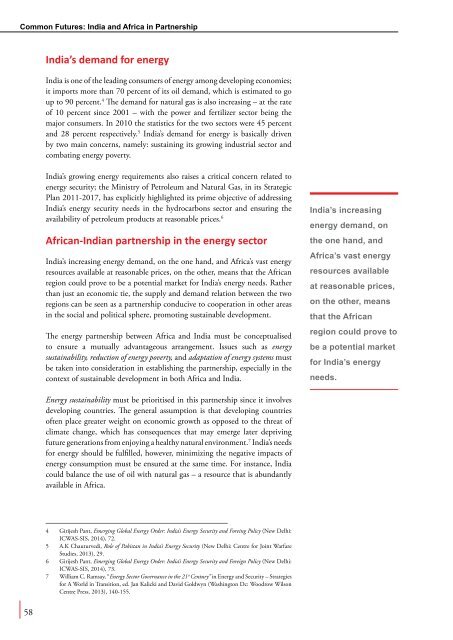Common Futures
II3UUw
II3UUw
You also want an ePaper? Increase the reach of your titles
YUMPU automatically turns print PDFs into web optimized ePapers that Google loves.
<strong>Common</strong> <strong>Futures</strong>: India and Africa in Partnership<br />
India’s demand for energy<br />
India is one of the leading consumers of energy among developing economies;<br />
it imports more than 70 percent of its oil demand, which is estimated to go<br />
up to 90 percent. 4 The demand for natural gas is also increasing – at the rate<br />
of 10 percent since 2001 – with the power and fertilizer sector being the<br />
major consumers. In 2010 the statistics for the two sectors were 45 percent<br />
and 28 percent respectively. 5 India’s demand for energy is basically driven<br />
by two main concerns, namely: sustaining its growing industrial sector and<br />
combating energy poverty.<br />
India’s growing energy requirements also raises a critical concern related to<br />
energy security; the Ministry of Petroleum and Natural Gas, in its Strategic<br />
Plan 2011-2017, has explicitly highlighted its prime objective of addressing<br />
India’s energy security needs in the hydrocarbons sector and ensuring the<br />
availability of petroleum products at reasonable prices. 6<br />
African-Indian partnership in the energy sector<br />
India’s increasing energy demand, on the one hand, and Africa’s vast energy<br />
resources available at reasonable prices, on the other, means that the African<br />
region could prove to be a potential market for India’s energy needs. Rather<br />
than just an economic tie, the supply and demand relation between the two<br />
regions can be seen as a partnership conducive to cooperation in other areas<br />
in the social and political sphere, promoting sustainable development.<br />
The energy partnership between Africa and India must be conceptualised<br />
to ensure a mutually advantageous arrangement. Issues such as energy<br />
sustainability, reduction of energy poverty, and adaptation of energy systems must<br />
be taken into consideration in establishing the partnership, especially in the<br />
context of sustainable development in both Africa and India.<br />
India’s increasing<br />
energy demand, on<br />
the one hand, and<br />
Africa’s vast energy<br />
resources available<br />
at reasonable prices,<br />
on the other, means<br />
that the African<br />
region could prove to<br />
be a potential market<br />
for India’s energy<br />
needs.<br />
Energy sustainability must be prioritised in this partnership since it involves<br />
developing countries. The general assumption is that developing countries<br />
often place greater weight on economic growth as opposed to the threat of<br />
climate change, which has consequences that may emerge later depriving<br />
future generations from enjoying a healthy natural environment. 7 India’s needs<br />
for energy should be fulfilled, however, minimizing the negative impacts of<br />
energy consumption must be ensured at the same time. For instance, India<br />
could balance the use of oil with natural gas – a resource that is abundantly<br />
available in Africa.<br />
4 Girijesh Pant, Emerging Global Energy Order: India’s Energy Security and Foreing Policy (New Delhi:<br />
ICWAS-SIS, 2014), 72.<br />
5 A.K Chauturvedi, Role of Pakistan in India’s Energy Security (New Delhi: Centre for Joint Warfare<br />
Studies, 2013), 29.<br />
6 Girijesh Pant, Emerging Global Energy Order: India’s Energy Security and Foreign Policy (New Delhi:<br />
ICWAS-SIS, 2014), 73.<br />
7 William C. Ramsay, “Energy Sector Governance in the 21 st Century” in Energy and Security – Strategies<br />
for A World in Transition, ed. Jan Kalicki and David Goldwyn (Washington Dc: Woodrow Wilson<br />
Centre Press, 2013), 140-155.<br />
58








